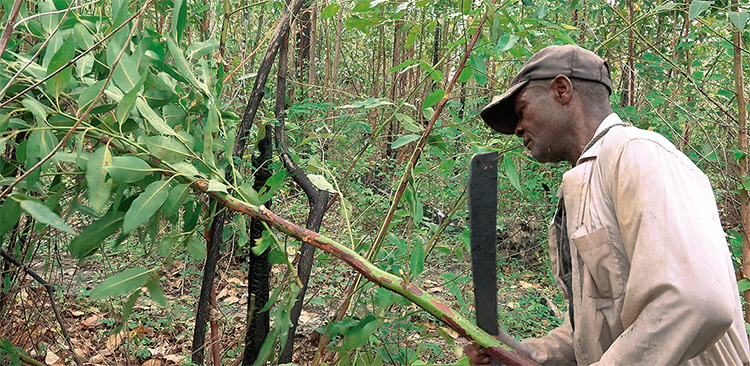![]() Cargando...
Cargando...
Pinar del Río—The mosquitoes are relentless; their buzzing and bites are bothersome, irritating, but they don’t stop the men who selectively fell trees in the forest to ensure the availability of curing sticks in the tobacco curing barns.»
There is no easy task in the forestry sector; all require physical effort, constant struggle with the weather, and other nuisances like noise and dust… although in recent times, the greatest challenge they face is the shortage of energy carriers.
The Solution: Work
Leduhan Menéndez, general director of the Pinar del Río Agroforestry Company, says that you can’t start the day thinking about what’s missing—the real challenge is: What am I going to do? With that philosophy, the young leader guides his team, and in just over five years, they’ve managed to transform the company’s economic indicators.
The company will host the provincial celebration for the Workers’ Day in the sector. It not only covers the municipality that bears its name but also extends to San Juan y Martínez, Consolación del Sur, and San Luis. In the latter, they lack a productive structure but manage a forest estate of 43,000 hectares.
Menéndez argues that the 43 measures approved to make the socialist state enterprise more flexible have opened doors. Their technical availability rate was at 10%, and they’ve now stabilized it above 75%.
He highlights this strength even though, so far this year, they’ve only received a third of the fuel they need. Still, this has allowed them to rent equipment and offer services to third parties—an important source of income.
Optimal use of the workforce is another pillar. They reduced indirect labor to 18%, redistributed workloads and responsibilities with corresponding compensation, and the results have been satisfying. With the implementation of Resolution No. 87, they hope to bring back professionals who left for other sectors due to low wages.
“Sometimes we can’t go out to work because there’s no fuel or the weather doesn’t allow it, but if we go, we have to do it well. Today, the average salary for direct workers is 12,000 pesos.”
He emphasizes that the TabaCuba Business Group is their main client; the partnership is advantageous, and they’re open to alliances.
Nursery, Improvements, and Diversification
Through the Mi Costa project—which offers nature-based solutions to climate change—a modernized nursery was acquired, increasing the survival rate of seedlings, lowering costs, and making the work less physically demanding, highlights Bernardo Tominaga Valdés, head of the Las Taironas management area.
“We work more comfortably, upright, with better quality, and our pay system improved because our results are better,” notes Mileidis Torres Rodríguez, general secretary of the union section at the unit. The innovation drew interest from several local women who came forward seeking employment, and steps are underway to expand the workforce.
This initiative contributes to the reforestation of the coastal strip with endemic species and uses the installed capacity to produce timber tree seedlings—without abandoning the traditional nursery.
Challenges
Frequent and prolonged power outages take a toll on industrial activity. Roger Piñero Rodríguez, coordinator of the Agroforestry Group in the province, explains that they prioritize protecting key productions such as sawn wood for coffins and housing modules. He also emphasizes their responsibility to deliver 800,000 pieces to TabaCuba for the construction of 3,000 tobacco curing barns.
Like forest guardian spirits, forestry workers are committed to ensuring the sustainable use and management of this valuable natural resource. Doing so efficiently, diversifying their products, adding value, and revitalizing technologies in the constant search for ways to modernize their facilities are major challenges—but ones that those who work with wood refuse to back down from.
Yolanda Molina Pérez
Licenciada en Periodismo (1995 Universidad de Oriente). Trabajó como periodista en Tele Cristal (Holguín) hasta marzo del 2003, directora y guionista de televisión.
Periodista del semanario Guerrillero (Pinar del Río) desde mayo del 2003 hasta la actualidad, corresponsal del semanario Trabajadores en esa provincia desde septiembre del 2020.
Creadora audiovisual y cinematográfica independiente.

